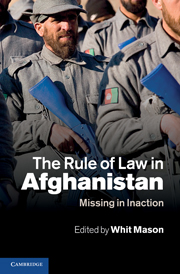Book contents
- Frontmatter
- Contents
- Contributors
- Preface and acknowledgements
- 1 Introduction
- PART I The scope and nature of the problem
- PART II The context
- PART III The political economy of opium
- PART IV Afghan approaches to security and the rule of law
- 9 Engaging traditional justice mechanisms in Afghanistan
- 10 Casualties of myopia
- 11 Land conflict in Afghanistan
- PART V International interventions
- PART VI Kandahar
- PART VII Conclusion
- Index
- References
10 - Casualties of myopia
Published online by Cambridge University Press: 01 June 2011
- Frontmatter
- Contents
- Contributors
- Preface and acknowledgements
- 1 Introduction
- PART I The scope and nature of the problem
- PART II The context
- PART III The political economy of opium
- PART IV Afghan approaches to security and the rule of law
- 9 Engaging traditional justice mechanisms in Afghanistan
- 10 Casualties of myopia
- 11 Land conflict in Afghanistan
- PART V International interventions
- PART VI Kandahar
- PART VII Conclusion
- Index
- References
Summary
Since 2002, the international community has launched a series of initiatives aimed at fostering the rule of law in Afghanistan. The Bonn agreement and its follow-up and conference created roles for ‘lead nations’ in various sectors of development: Italy was assigned the justice system, while Germany was assigned police and the UK counter-narcotics. The London compact in January 2006 attempted to create an Afghan-owned national development strategy, the Rome conference in July 2007 framed an Afghan-managed national justice sector project, and since October 2009 the international community has intensely escalated its pressure on the Afghan government to tackle the crippling corruption. In 2010, the US, as the highest spending justice donor, has added to its strategy significant assistance to customary (non-state) justice mechanisms.
At the technical level, international influence has been distorted by bureaucratic inefficiency and self-interested policies and implementation, an emergency rather than sustainable development mindset, and a lack of coordination and collaboration both within the international community and between foreign donors and Afghanistan's justice institutions and stakeholders. Still worse, the international community has failed to help establish the necessary preconditions for the long-term legal and political development necessary to make the justice system a source of legitimacy, predictability and protection for the wider society. Among these, none is more fundamental, as has belatedly been recognised, than checking corruption and ending the impunity of the powerful.
- Type
- Chapter
- Information
- The Rule of Law in AfghanistanMissing in Inaction, pp. 172 - 204Publisher: Cambridge University PressPrint publication year: 2011
References
- 1
- Cited by

